Wilma Eubanks lived an energetic, dedicated and deliberate life, working diligently at her job with the City of Springfield until two weeks before she died at age 98.
You read that right.
Wilma was the city’s oldest employee when, hospitalized in late April with a weakened heart and other ailments, she told her doctors to stop curative treatments.
“She felt she’d lived her life, and she was content to leave,” daughter Donna Shiflett explains. “She was done.”
“She was ready to go,” agrees daughter Ruth Gross.
“She knew we weren’t ready,” Shiflett says. “But she was.”
After delaying slightly to await the birth of her first great-granddaughter, whom she “met” over screens via FaceTime, Wilma departed on April 29.
A model professional in municipal court

It’s not only blood relatives who mourn her passing. Wilma had another family — her fellow employees at Springfield Municipal Court, where she performed clerical duties for almost 40 years.
“Wilma’s commitment to serve the court throughout the years was simply spectacular,” says Kyle O’Dell, court administrator. “She set a high standard of expectation for herself, and consistently modeled professionalism as she went about her daily work. She was an outstanding employee that anyone would be delighted to have on their team, but more importantly, she was an amazing person.”
Such accolades are echoed by other court personnel, from judge to janitor.
They marvel at the memory of her independence. Wilma lived alone in her own house in southwest Springfield, even mowing the lawn herself until just a few years ago. She continued to drive her own car.
They also appreciated her thoughtfulness.
“She mothered us all,” recalls Sharon Matlock, a member of the clerical staff. “If any of us were out sick, she would call and check on us. And the last thing she’d say would be, ‘Now, if there’s anything I can do, you call me.’ And she meant it. Absolutely.”
Court bailiff Tina Sides tells of a time when she was notified her granddaughter had been taken to an emergency room. Sides hurried to the hospital — but “Wilma beat me there. She was sitting in the waiting room when I got to the ER.”
“Wilma was a giver,” adds fellow clerk Vaunda Logan. “You couldn’t out-give Wilma. No matter what little thing you did — print the newsletter for her, maybe — she felt she owed you something back. I’d say, ‘Wilma, that’s my job,’ but she always wanted to tell you how much she appreciated it.”
Care for coworkers beyond the workplace
Another court colleague, Kimberly Castillo, describes Wilma as “an amazing lady. She always had a smile on her face.”
That smile is widely and fondly remembered.
“Every morning when you came into work, Wilma was always there to greet you, bright-eyed and smiling,” says Judge Wendy Garrison. “She’d always ask how you were doing. And if she knew there was something that you were dealing with, she would specifically ask about that, about how that was going. She frequently wrote cards and notes of encouragement or celebration, something that would light up your day.”
Ronnie Holmes, the court’s deputy clerk, enjoyed similar experiences with Wilma: “She always greeted you with a ‘Good morning.’ She was always the first one here, and always made sure to say ‘Goodbye’ when she left in the afternoon.
“Seeing her desk empty is still a shock, as it had always had her sitting there, working away.”
An unmatched work ethic
Work had been a major component of Wilma’s life from the beginning. She was born Wilma Doris Tunnell in 1924 into a farm family near the Barry County community of Jenkins. Following graduation from Verona High School in 1943, she went to work in a shoe factory in Aurora.
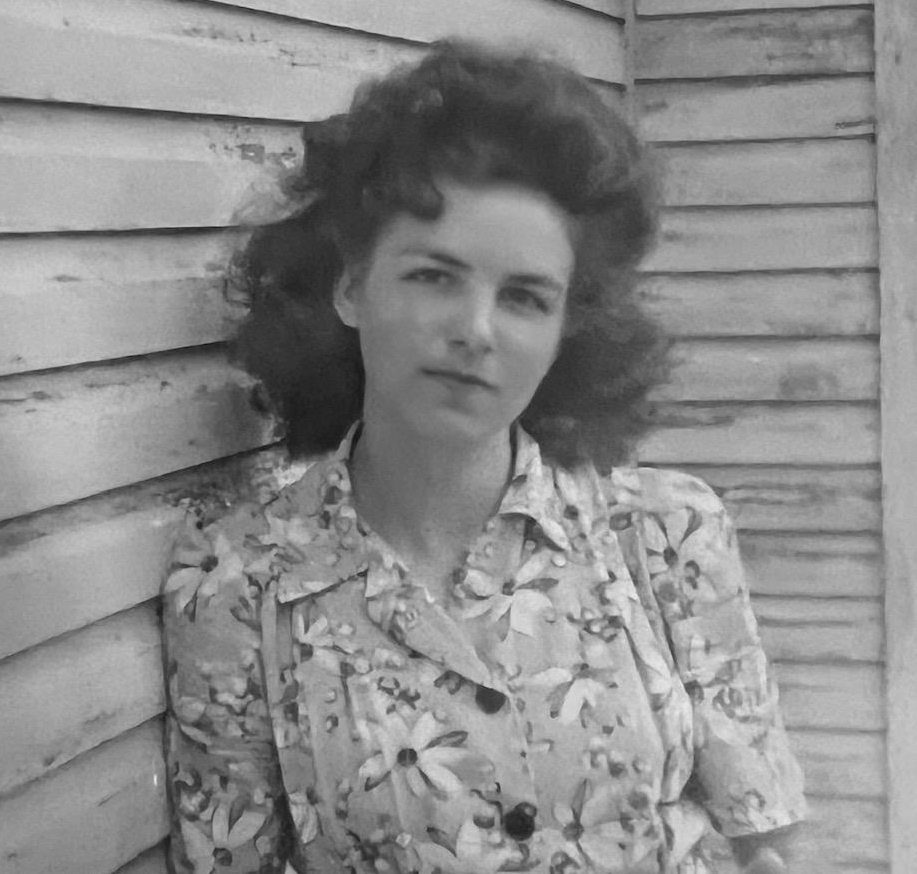
On the Fourth of July in 1947, Wilma married Elmer Lloyd “Bud” Eubanks, whom she’d met at a roller skating rink. Bud, who entered the ministry, suffered a massive heart attack at the age of 42 and couldn’t return to the pulpit. Wilma had been a stay-at-home mom up to that point, but she took night classes and learned shorthand so she could do secretarial work.
The couple and their two daughters had been living in Columbia, but moved to Springfield in 1970 to be closer to Wilma’s parents. She worked various clerical jobs until she hired on at Springfield Municipal Court, where she worked full time until retiring in 1991.
“About six months after she retired, our dad died suddenly,” Shiflett recounts. “She waited a couple of years, but then she went back to the court when they called about a part-time job opening.”
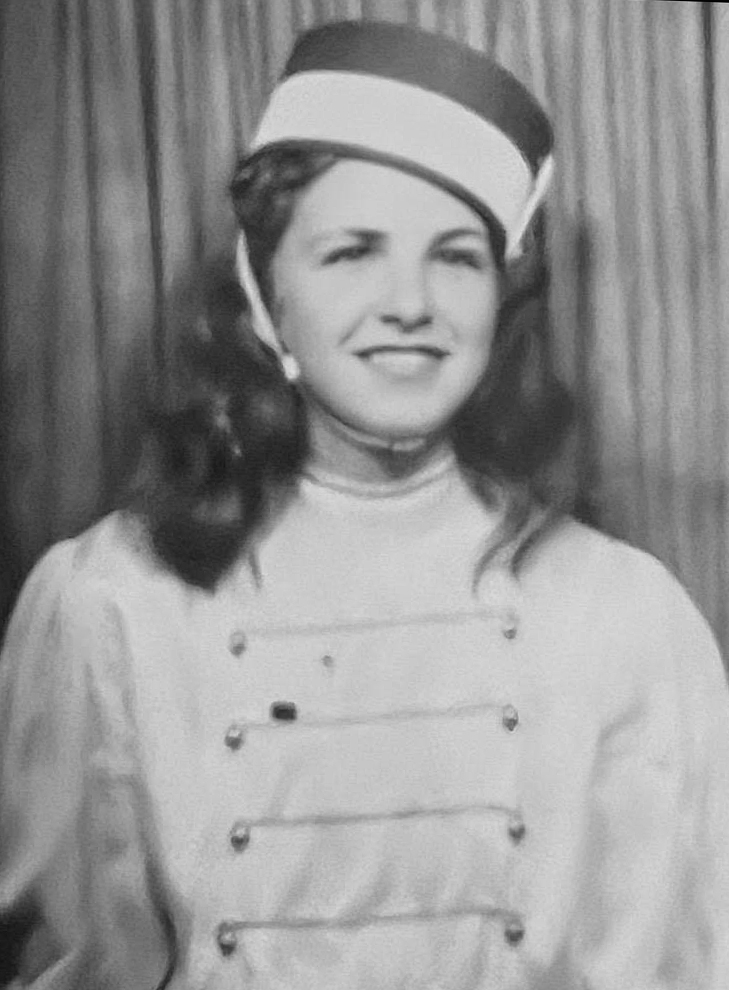
Notes granddaughter Amy Shepard with a laugh: “That was supposed to be a temporary job, but…”
For many years, Wilma’s chief duty was to enter data about the traffic violation tickets issued by Springfield police officers.
“She had to alphabetize the tickets, code them according to the violation — a lot of preparation before she could even begin to enter the data,” says Matlock. “She did everything but parking tickets, and if she got caught up, which she often did, she would even enter those, too.
“Those few times when she was gone for an illness or an injury, we were reminded how much we appreciated Wilma because it was hard to keep up, and we were here full time.”
‘You will find something else for her to do'
In 2021, the city court stopped using its longtime in-house data system and joined the statewide court information system. So there was no more data entry for Wilma to do.
“She was just sure that she was going to lose her job,” says Matlock. “But I was told, ‘Wilma is not going to lose her job. You will find something else for her to do.’ And we did.”
The past couple of years, Wilma took on chores such as inspecting thousands of old case files, looking them up on the computer, removing outdated warrants that needed to be shredded and auditing payment plans.
“Her mind was sharp as it could be,” and Wilma was a quick learner, says Matlock. “She kept getting done with jobs long before I was ready to figure out what to do next.”
“She had the best work ethic of anybody I know,” Sides observed. “Of my time here, I can’t think of Wilma ever being late.”
“Or idle,” Logan adds.
Judge Garrison says Wilma’s professional work performance was mirrored in her professional wardrobe. “She wore suits every day. And she always wore high heels – yes, even at 98.”
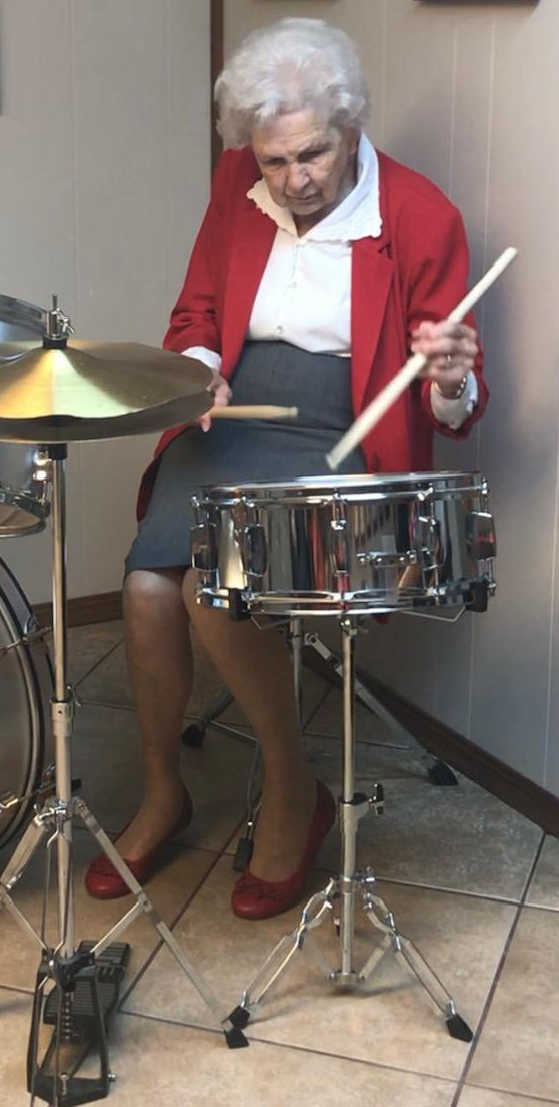
While emphasizing her professional qualities, her workmates and family are even more effusive in praising Wilma’s personal demeanor and good humor.
“For years she knew the cheapest gas in town,” says Logan. “She’d say, ‘Honey, go to the Payless, or the Conoco on such-and-such a street.’” That stopped a couple of years ago when one of the new clerks introduced Wilma to the Gas Buddy internet app.
Wilma also was a zealous clipper of coupons, and she readily shared them with coworkers.
“When I first started, I still had kids in diapers,” Matlock says. “Wilma would bring in diaper coupons for those of us who had babies. She was just always thinking of everybody else.”
Logan cites another example of Wilma’s thoughtfulness:
“If treats were brought in but you were at a doctor appointment that morning and so you weren’t here, she would take one out and put your name on it. And then when you got to work, she’d say, ‘Now, honey, I saved you a doughnut’ or whatever. She didn’t want anyone to miss out on anything.”
The court crew was well aware of Wilma’s appetite for pie.
“She was the reason we’d have a ‘Pie Day’ on her birthday, and once in a while just for fun, because we knew Wilma liked it,” Logan says.
Sides says Wilma was especially fond of pecan pie “and that Japanese fruit pie that she would make. Those were her two favorites. And for everybody’s birthday, she would make no-bake cookies.”
Occasionally, Wilma would go easy on eating the goodies herself.
“She only weighed something like 107 pounds,” says Sides, “but she was always worried about her weight. One time she got up to 111 pounds and about had a fit.”
According to Logan, french fries were another of Wilma’s weaknesses. “If she had a doctor appointment coming up, she wouldn’t eat french fries for three or four days. She wanted her cholesterol numbers to be where they were supposed to be when the doctor checked.”
A foot of lead and a not-so-secret love of the soaps
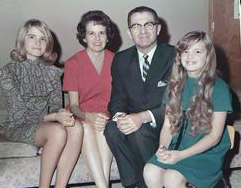
Sides was a frequent passenger in Wilma’s car and approved of her performance at the wheel.
“We’d go to Aurora to get the oil in her car changed. We’d go to Branson to go shopping, and she would drive. She was a good driver.”
Shepard, her granddaughter, admits that Wilma “had a little bit of a lead foot” on the throttle. “But we were never going to tell her that we wanted to take her car keys away. That would not have gone over well.”
Sides also was amazed at Wilma’s seemingly boundless energy.
“She used to record her TV soaps (especially “The Young and the Restless”) and then watched them as she walked on her treadmill every evening to get her exercise in.”
That memory prompts a chuckle from Matlock: “There was a character on one soap with the same name as mine. I was fairly new here, and at first I thought she was talking about me when I’d hear her talking about the show. I’d go, ‘I did WHAT?’ I didn’t realize she was talking about a soap opera. But I got used to it after a while.”
Like her coworkers at the court, Wilma’s family members were aware of her cooking prowess. Meatloaf, fried chicken and chocolate chip cookies were among her specialties. “And we had pie or cobbler every day when we were growing up,” adds Gross.
Shiflett confirms that her mom was a good cook. And Shiflett wanted to learn those kitchen skills. “But it wasn’t fun trying to cook with her, because after every little mess that you made, she would go around behind you cleaning it up. So finally I just gave up.”
Gross has similar recollections. “When we were teenagers still living at home, and she was working and wouldn’t get off until 5 o’clock, we’d try to start dinner for her. But the minute she got home she was like ‘Let me do it.’ She didn’t want us dirtying up her kitchen.”
Wilma’s penchant for cleanliness extended beyond the kitchen — and to her daughters, too.
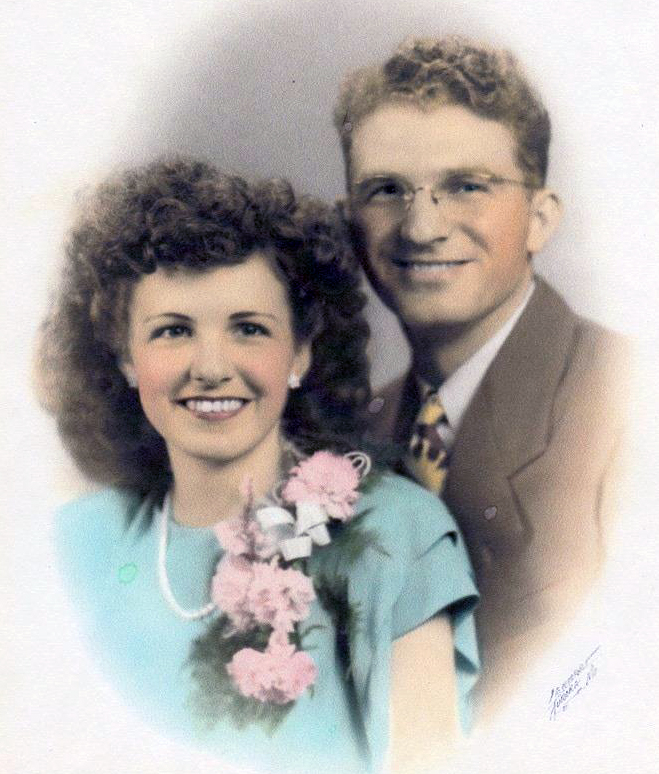
“The entire house was always immaculate,” Shiflett recalls. “When we were little, she couldn’t stand for us to be dirty. If we got a speck of dirt on us, she’d make us go change our clothes.”
Her daughter says Wilma even regularly cleaned her late husband’s grave, which for many years she visited daily at Hazelwood Cemetery:
“She kept a little pail in her car and took along bottled water and a cloth. If there was a bird mess or something on the stone, she would wipe that stuff off. And if she didn’t think they’d done a good-enough job of weed-eating, she’d get after that, too.”
‘She was so kind to everybody'
As a grandchild, Shepard enjoyed the attention Wilma lavished on that generation. Wilma often looked after the youngsters at her house after school, and always had some Little Debbie snack cakes or other tasty treats waiting for the kids when they arrived. In winter, Wilma would place the children’s shoes near a heat vent so they would be warm when it was time to go.
Shiflett says her mother was an excellent role model, “because she was so kind to everybody. All of us could learn from how she treated people, always taking care of people. She set the bar high.”
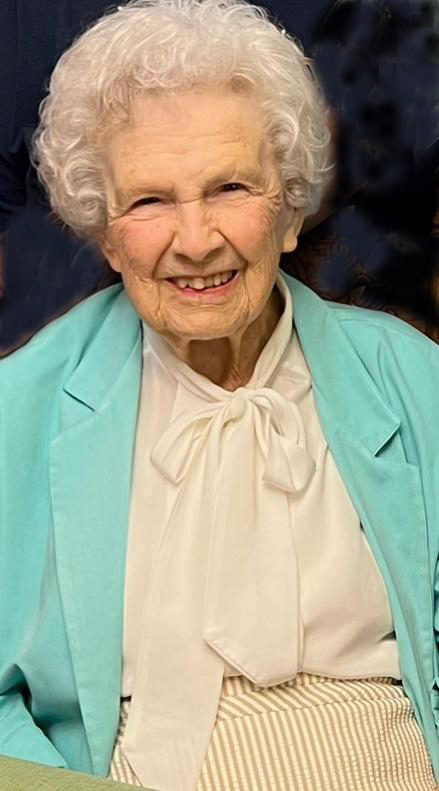
Wilma’s caring for others continued to her last days. Shepard recounts:
“Even though she was very, very ill in the hospital, she still was always looking out for everybody else. She was always trying to give me money to go downstairs to get something to eat in the cafeteria. Or she’d tell me to leave so I’d beat the rush-hour traffic.
“That’s just who she was. Even when she was dying, she was still worrying about other people.”
Shepard says on that day in late April when Wilma withdrew from medical treatment other than pain management, “she spent the next few hours calling 20 or more people, telling them goodbye. It was one of the most amazing things I’ve ever seen. She was very matter-of-fact. ‘I’ve made this decision,’ she’d tell them..
“She died two days later. She did it her way — she went how she wanted to go.”
In an unusual move, Springfield Municipal Court was closed for three hours midday on Wednesday, May 3, so that all court employees could attend Wilma’s funeral service, followed by her burial next to Bud at Hazlewood.
“One thing I’ll always remember is something that her pastor said at the service,” Judge Garrison notes. “He said that he visited her in the hospital, and he asked her, ‘Wilma, is it OK if I pray for you?’
“And she said, ‘Well, yes, as long as you don’t pray for me to get better.’”
Says Matlock: “Who else but Wilma gets to leave this world on their own terms?”
Adds Logan: “She was the person we should all strive to be.”


